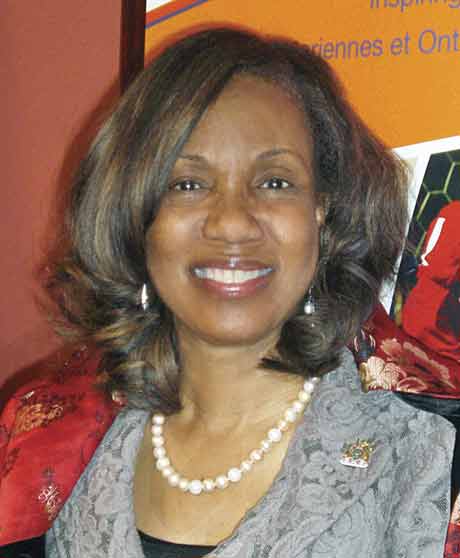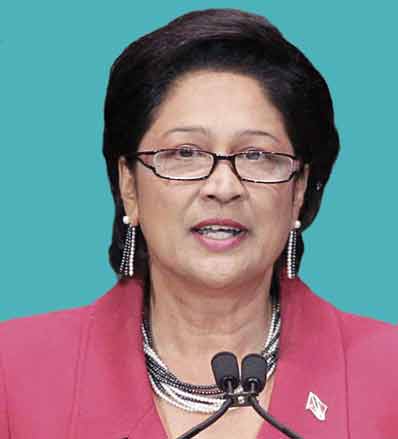Ontario wants health promotion culture, tobacco control

Margarett Best, Ontario’s Minister of Health Promotion and Sport
(William Doyle-Marshall pix)
By
William Doyle-Marshall
The Ontario Government is committed to prevent youth from starting to smoke. Minister of Health promotion and Sport Margarett Best made this disclosure during National Non Smoking Week. Since 2005 the government has invested approximately $37 million in programmes to prevent youth from starting to smoke.
During a Round Table Session with members of the media the minister said in the process of discouraging young people from smoking adults have a serious role to play.
“When adults smoke they are role models. Kids look at what the adults are doing so we want to put the onus on the adults to ensure that children and young people do not start to smoke in the first place,” the minister said.
According to ministry surveys, Seventy five percent of children in grades one through 12 say that they have not smoked cigarette. Ontario Government has invested $4.7 million in a number of youth anti-tobacco initiatives. They include tobacco control in communities and hiring full time youth engagement coordinators in the province’s public health unit to be resources for youth.
Further grassroots programmes to reach more youth in each of Ontario’s seven tobacco control networks are in operation. “We want to see more young people not taking up the habit in the first place. We want to develop a culture of people who think in terms of health promotion and hence the reason why we have been controlling tobacco use as part of the discussion in our healthy communities programme and our after school programmes, so we can educate and raise awareness in young people about the dangers associated with cigarette smoking and the fact that 250 people die each week in Ontario from tobacco smoking,” Best continued.
Key priorities for the Ontario Government’s Ministry of Health Promotion and Sport are health, fitness and sport. The emphasis is in getting the people of the province to adopt healthy eating choices and getting active. The state of children’s health is a primary concern because more than 50% of Ontarians are of an unhealthy weight and only 14% of the children and youth pursue recommended levels of physical activity.
“We know that active children with healthy eating habits have a better chance of growing into healthy adults with less chance of developing a variety of problems like diabetes and heart disease,” the minister explained. That reality caused the ministry to recently launch a Healthy Living Initiative to help parents who want to make changes to their families’ eating habits or have the desire to become more physically active.
Members of the South Asian and African Canadian communities are among those prone to suffer from high blood pressure and diabetes, according to information released by the Ministry of Health Promotion.
For additional tips and information a visit to the ministry’s Website is advised - Ontario.ca/healthy
“Eat Right Ontario” launched by the Ministry of Health Promotion and Sport provides free access to a registered dietitan who can answer questions about everyday food choices, disease prevention and popular nutrition topics.
According to the Minister, her after school programme - in 300 locations across Ontario in schools, in community and recreation centers - gives more than 18,000 children and youth safe, active and healthy after school initiatives. This $10 million programme provides kids in priority neighbourhoods – low-income and First Nations as well as rural communities – access to sports, recreational, arts and cultural activities. They also receive homework assistance, healthy snacks, nutrition and wellness education.
The ministry of Health Promotion and Sport is working with the Chiefs of Ontario to invest up to $500,000 in after school programmes in First Nation Communities for this school year. This is a critical component of the Ontario Government Poverty Reduction strategy.
Through Healthy Communities Fund the province is supporting nearly 200 local and provincial organizations to deliver programmes that improve the health of approximately 500,000 Ontarians. Over the past two years alone, it cost the government $24 million to deliver programmes and services focussing on physical activity, healthy eating, injury prevention, tobacco controls, substance and alcohol misuse and the promotion of mental health.
Without specific information on how many more kids are physically active or how many have stopped smoking, staff reported approximately 18,000 youths are being served every day in the after school programme. They are getting three hours of physical active and healthy and nutritious food. Some children say that’s their only opportunity to eat a healthy and nutritious snack in the day-time.

Special to Indo Caribbean World
Port-of-Spain - On January 24, 2011, Prime Minister Kamla Persad-Bissessar celebrated her first anniversary as political leader of the United National Congress, a role she had wrested from her political mentor and former Prime Minister Basdeo Panday.
Many, including Panday, thought the celebration, held at the UNC Rienzi Complex headquarters in Couva, was ‘too much of a muchness’ over what was really an internal election victory.
Persad-Bissessar wore a yellow outfit — the brand colour of the UNC - as did all the members of her government for the fete at Rienzi Complex. Supporters waved yellow flags and partied to the music of soca star Machel Montano.
Twenty-four is an important figure in Persad-Bissessar’s political calendar. She’s been in politics 24 years, she became leader of the UNC on January 24, 2010, and she won the May 24, 2010, general election to become Prime Minister.
Within four months from January 24, 2010, to May 24, 2010, she excised two longstanding political figures from the Trinidad and Tobago landscape: Panday and former Prime Minister Patrick Manning - all this, amidst a snap general election that was not constitutionally due until 2012.
While it is a full four months before she celebrates her first year in office as Prime Minister, the last eight months have been filled with many embarrassing moments.
Persad-Bissessar has been hailed for keeping together a multi-party government together in a country that is traditionally a two-party state: the UNC, the Congress of the People, the Movement for Social Justice, the National Joint Action Committee, and the Tobago Organisation of the People. However, there are fears that the coalition government might suffer the same fate as the National Alliance for Reconstruction which fell apart back in the mid-1980s when Panday disagreed with then prime minister, Arthur NR Robinson.
Persad-Bissessar’s government continues to be assailed with missteps, gaffes and faux pas.
The most recent was the inexplicable appointment of Reshmi Usha Ramnarine, 31, as director of the Strategy Security Agency in mid-January. The Office of the President, which sent out a release on the Ramnarine appointment, erroneously stated Ramnarine was appointed director of the Security Intelligence Agency. The SIA was a spy agency that former Prime Minister Manning had set up, and whose activities involved alleged spying on judges, trade unionists, media workers, politicians and ordinary citizens.
Opposition Leader Dr Keith Rowley strongly criticised Ramnarine’s appointment. He demanded that Persad-Bissessar immediately rescind Ramnarine’s directorship.
Rowley said the Opposition PNM would have to reconsider all its efforts of collaboration with the PP government if its call to recall Ramnarine’s appointment was ignored.
“This is the most shocking thing the government has done,” he said, adding that the matter was too serious to be treated as another gaffe.
“We believe the government is going down a reckless road, oblivious to its effects on the people of Trinidad and Tobago. It is our view that we have to consider our relationship with this government, this governing 29, this coalition of the mad, of the incompetent,” Rowley added.
He asked many questions about Ramnarine: “Who is this Reshmi Usha Ramnarine? Where did she come from? What position of responsibility or authority did she hold in any major, senior or sensitive appointment in the public or private sector? What suitable qualifications does she hold?”
He said former SIA director Nigel Clement, former acting Police Commissioner and former director at the Special Anti-crime Unit of Trinidad and Tobago Brigadier Peter Joseph - all qualified - were humiliated out of office by the PP government.
Rowley also wanted to know if there was “any truth in the allegation that she (Ramnarine) may have used her position (earlier) in the SIA to obtain and share information in an unauthorised manner with persons who were recently appointed to advisory positions to the Prime Minister.”
Also, “this person is alleged to have used information in an improper manner, sharing it with persons who were at the time with the media and who, today, advise the Prime Minister on matters of state.”
PP blunders continued to escalate.
On January 27 National Security Minister Brigadier John Sandy apologised for telling the Parliament and the Trinidad and Tobago public that Ramnarine was a graduate of the University of the West Indies. She was not.
In a brief statement, Sandy said it was never his intention to mislead Parliament or the public.
Sandy’s apology, one in a series by other ministers in the PP government, came after Rowley said he intended to request the House Speaker send Sandy before the Privileges Committee for misleading Parliament.
Preceding Sandy’s apology was Legal Affairs Minister Prakash Ramadhar, who apologised on January 26 for saying Ramnarine had a degree in information technology and was pursuing another in psychology. Both statements were untrue.
“I want to apologise to the nation if in any way I would have said anything that led anyone to believe that which I honestly held based on the information I was given,” Ramadhar said.
A week before these two apologies by Sandy and Ramadhar, Foreign Affairs Minister Surujrattan Rambachan insisted on Ramnarine’s university education and suitability to lead the SSA.
Persad-Bissessar, who as Prime Minister is chairman of the National Security Council, has refused to apologise. Later she not only lost her cool when questioned by reporters over the Ramnarine affair, but also refused to apologise for any of it.
She said she had no intention of making Rowley “happy” by giving an apology on the matter.
“She (Ramnarine) has now resigned, now let us move forward,” she said.
Prior to the Ramnarine fiasco, there were calls for Attorney General Anand Ramlogan to apologise to Manning for demanding an explanation for what Ramlogan described as the disappearance of a Bosendorfer grand piano.
Ramlogan claimed the piano could not be found at the Prime Minister's official residence, also known as the Diplomatic Centre.
At the first sitting of Parliament on January 12, Ramlogan revealed that ten pianos were purchased by the University of Trinidad and Tobago from Bosendorfer in the US for (US) $850,677.
Stating that one of the pianos was missing from the Diplomatic Centre, Ramlogan called on Manning to help find it.
Manning, hosting a press conference on January 13, said he had left the piano at the Diplomatic Centre, that it was stored at the eastern side of the stage. This was the location where it was later found. Ramlogan has refused to apologise.
Speaking at a post-Cabinet press conference on January 19, Ramlogan said: "The first port of call for an apology will be an apology for the misuse and vulgar abuse of public funds to purchase ten grand pianos at a time when the country did not have enough beds in the hospital.
“When that apology is given to the people of this country, then any other apology can be considered at an appropriate time. No one can instruct me to apologise, except the Prime Minister, and no such instruction has been given.”